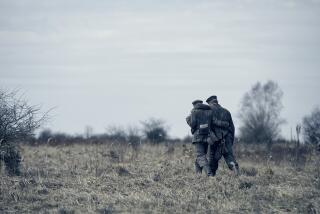The Casualty by Heinrich Boll; translated by Leila Vennewitz (Farrar, Straus & Giroux: $16.95; 189 pp.)
- Share via
It would be nice to find one short story in this collection by the late Nobel laureate that is worth the $16.95 price of admission, but while a few come close, none quite makes it. Nobel Prize or not, this is a collection of very short stories that would fail to impress in a college publication.
Perhaps it’s the translation from the German, although translator Leila Vennewitz has won prizes for her previous efforts, but the images are too often trite and repetitive and the overall point obvious. War, he tells us over and over, is as banal as it is bloody and all are victims. The nights are very silent, the shooting when it occurs is very loud and the blood when it pours, which is often, is a very dark red.
To publish this way about World War II so many years after the carnage and genocide is disappointing. Perhaps when Heinrich Boll, who served as a German soldier, wrote these prose ditties in the five years after the war ended, it was important to remember that some Germans were also innocent fodder to Hitler’s madness. Average German soldiers like himself were often just farm kids and urban loafers trying to get by. But to stop there? As if Nazism were not a unique evil. As if the moral choices were not sharper.
The book jacket states that “With clear-eyed sympathy, Boll captures the suffering of the ordinary German who paid for the war.” Too much sympathy. They were not the ones who paid most for the war. Six million Jews and 20 million Russians ought not to be left out of the equation.
The German people, with shockingly few exceptions, cheered Hitler when he was on the rise, they loved the promise of economic and military power, and the unexplored question for this book is why so few of them thought to challenge Hitler’s message when the madman appeared to be a winner.
In the one story that promises but fails to break out of this insistence that evil is always banal, a Russian peasant is killed for having a hooked nose--for looking Jewish, according to Boll. But even here, the greatest perversion of the human spirit--the insane desire to purify the race is presented as simply another byproduct of nationalism distorted in the crucible of war. As if it is to be expected that whenever nations go to war, they will descend into an orgy of genocide.
Nowhere is there a suggestion that anything in German history or society contributed to what fortunately has been a one-of-a-kind incursion into brutality. Unique because this frenzy of hate and killing was conducted by those thought to be among the most civilized, refined and indeed restrained of men. Farm boys may have done much of the killing as directed by their officers, but both groups were the product of German civilization.
These were not illiterate masses whipped into battle as we see now in the Iran-Iraq war, but rather the finest flowering of German youth. How then to explain their descent to a point lower than that attained by the rapists in the employ of Genghis Khan? Boll, who has attempted to answer that all important question elsewhere, simply avoids it in this collection, and what he does deal with merits the attention only of literary scholars who have made his work their specialty.
More to Read
Sign up for our Book Club newsletter
Get the latest news, events and more from the Los Angeles Times Book Club, and help us get L.A. reading and talking.
You may occasionally receive promotional content from the Los Angeles Times.










